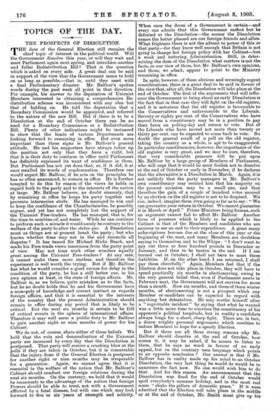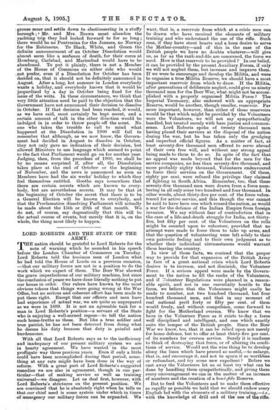THE PROSPECTS OF DISSOLUTION.
TOPICS OF THE DAY.
• which is asked on every side. A great deal can be said in support of the view that the Government mean to hold on as long as possible,—that is, until they meet with a final Parliamentary disaster. Mr. Balfour's spoken words during the past week all point in that direction. For example, his answer to the deputation of Unionist Members interested in obtaining a comprehensive Re- distribution scheme was inconsistent with any idea but that of holding on. He told the deputation that a Boundary Commission would be appointed, and referred to the nature of the new Bill. But if there is to be a Dissolution at the end of October there can be no need for a Boundary Commission or a Redistribution Bill. Plenty of other indications might be instanced to show that the heads of various Departments are looking forward to remaining in office. But even more important than these signs is Mr. Balfour's general attitude. He and his supporters have always taken up • the potation not only that they have a right, but that it is their duty to continue in office until Parliament has definitely expressed its want of confidence in them. But Parliament has not vet done that, or, if it did, it at once recalled its words of condemnation. Therefore one would expect Mr. Balfour, if he acts on the principles he has so often announced, to remain in office. He is further tempted to do this by reason of the views he holds in regard both to the party and to the interests of the nation at large. Mr. Balfour believes, no doubt sincerely, that ty remaining in office he keeps his party together and prevents internecine strife. He has managed to win and to keep the confidence of the Chamberlainites, he possibly argues, and yet has not completely lost the support of the Unionist Free-traders. He has managed, that is, for the time to combine oil and water. While he can continue to perform such a miracle it would surely be contrary to the -welfare of the party to alter the status quo. A Dissolution must as things are at present break the party ; but who knows whether time may not in the end reconcile all disputes ? It has tamed Sir Michael Hicks Beach, and made his Free-trade views innocuous from the party point of view. May not time work other wonders equally great among the Unionist Free-traders ? At any rate, it cannot make them more restless, and therefore the experiment is well worth the trying. But if Mr. Balfour has what he would consider a good excuse for delay in the condition of the party, he has a still better one, in his own opinion at least, in the state of foreign affairs. Mr. Balfour is, as we believe, quite mistaken as to the facts, but he no doubt holds that he and his Government have a monopoly of knowledge and correct instinct as regards foreign affairs, and that it is essential to the interests of the country that the present Administration should remain in office during any period that is likely to be • critical. But the next six months is certain to be full of critical events in the sphere of international affairs. Therefore it may well seem a public duty to Mr. Balfour to gain another eight or nine months of power for his Cabinet.
We do not, of course, share either of these beliefs. We hold that the ruin and demoralisation of the Unionist party are increased by every day that the Dissolution is postponed. That party will receive a crushing blow at the polls if they are taken in October, but it is conceivable that the injury done if the General Election is postponed for another eight or nine months may be irreparable for a generation. Again, we cannot agree that it is. essential to the welfare of the nation that Mr. Balfour's Cabinet should conduct our foreign relations during the next six months. On the contrary, we hold that it would be immensely to the advantage of the nation that foreign Powers should be able to treat, not with a Government afflicted by a fatal disease, but with one which may look: 'forward to -five -or Six -Years ' of Strength and -activity. When once the doom' of a Government is certain—and every one admits that this Government cantot but be defeated at the Dissolution—the sooner the Dissolution comes the better pleased are our foreign friends and allies. What frightens them is not the advent to power of this or that party—for they know well enough that Britain is not going to change her foreign policy with her Cabinet—but a weak and tottering Administration. Still, in deter- mining the date of the Dissolution what matters is not the facts, or our view of them, but Mr. Balfour's own opinions, and those, we admit, appear to point to the Ministry remaining in office.
In spite, however, of these obvious and seemingly cogent considerations, there is a great deal to be said in favour of the view that, after all, the Dissolution will take place at the end of October. The first of the arguments that will influ- ence the Government to bring about an early Dissolution is the fact that in that case they will fight on the old register, and it is notorious that the old register is favourable to the Conservatives and unfavourable to the Liberals. Seventy or eighty per cent. of the Conservatives who have moved from a constituency may be in a position to pay their fares on polling-day and return to vote. But of the Liberals who have moved not more than twenty or thirty per cent. can be expected to come back to vote. No doubt the general result of a poll on the old register, taking the country as a whole, is apt to be exaggerated. In particular constituencies, however, the importance of the old register is very great, and we may be sure, therefore, that very considerable pressure will be put upon Mr. Balfour by a large group of Members of Parliament, who will urge that it would be most foolish not to dissolve at the end of October or early in November, if he declares that the alternative is a Dissolution in March Again, it is not unlikely that the party managers in Mr. Balfonr's own constituency may remind him that his majority on the present occasion may be a small one, and. that therefore the gain of a couple of hundred votes secured by an election on the old register is not to be despised. We can, indeed, imagine them even going so far as to say : "We can guarantee your return in October. We cannot guarantee it in March or April." Prime Ministers being human, such an argument cannot fail to affect Mr. Balfour. Another form of pressure which is likely to be applied to the Cabinet is that of the Members and candidates who are anxious to see an end to their expenditure. A great many subscriptions become due at the close of this year or the beginning of the next, and many Members are doubtless saying to themselves and to the Whips : "I don't want to pay out three or four hundred pounds in December or January, and then to be beaten in the end. If I am turned out in October, I shall not have to meet these liabilities. If, on the other band, I am returned, I shall pay them cheerfully." Again, Members feel that if the Election does not take place in October, they will have to spend practically six months in electioneering, owing to the very general belief that, even if Parliament meets in February next, the Government will not survive for more than a month. Now six months, and three of them winter months, of electioneering is not a prospect which any Member or candidate can be expected to regard with anything but detestation. He may soothe himself after a "regrettable incident" by saying that what he wanted was a little more time to convince the constituency of his opponent's political turpitude, but in reality' a candidate always longs for a short, sharp fight. There are, in fact, a dozen weighty personal arguments which combine to induce Members to hope for a speedy Election.
But if there are all these strong reasons why Mr. Balfour should dissolve at the end of October, how comes it, it may be asked, if he means to listen to them, that he says no word in favour of an early appeal, but on the contrary uses language which points to an opposite conclusion ? Our answer is that if Mr. Balfour has in reality made up his mind to an October Dissolution, the very last thing he would do would be to announce the fact now. No one would wish him to do that. And for this reason. An announcement that the Dissolution was fixed for the end Of October would spoil everybody's summer holiday, and in the most real sense "shake the pillars of domestic peace." If it were admitted that the Election will take place in the middle or at the end of October, Mr. Smith must give up his • grouse moor and settle down to electioneering in a stuffy borough ;1 Mr. and Mrs. Brown must abandon the yachting trip they had looked forward to for so long ; there would be no Pontresina for the Joneses, no Norway for the Robinsons. To Black, White, and Green the definite announcement of an October Dissolution would almost seem like a sentence of death, for their cures at Homburg, Carlsbad, and Marienbad would have to be abandoned. To put it plainly, there is not a Member of the House of Commons on either side who would ,not prefer, even if a Dissolution for October has been decided on, that it should not be definitely announced in August. After a long, hot summer in London everybody wants a holiday, and everybody knows that it would be jeopardised by a day in October being fixed for the issue of the writs. In these circumstances, we think that very little attention need be paid to the objection that the Government have not announced their decision to dissolve in October. If that decision had been reached, it would, as we have said, most certainly be kept secret, and a certain amount of talk in the other direction would be indulged in in order to throw people off the scent. No one who takes the trouble to call to mind what happened at the Dissolution in 1900 will fail to remember that although, as we now know, the Govern- ment had decided in August to dissolve in October, they not only gave no indication of their decision, but allowed Ministers to use language which seemed to point to the fact that Parliament would go on for another year. Judging, then, from the precedent of 1900, we shall be by no means surprised if, after all, the Dissolution takes place at the end. of October or the beginning of November, and the news is announced as soon as Members have had. the six weeks' holiday to which they feel themselves entitled. Goethe says somewhere that there are certain secrets which are known to every- body, but are nevertheless secrets. It may be that at the beginning of October the secret that there is to be a General Election will be known to everybody, and that the Proclamation dissolving Parliament will actually be made about the 15th or 20th of that month. We do not, of course, say dogmatically that this will be the actual course of events, but merely that it is, on the whole, the thing most likely to happen.







































 Previous page
Previous page